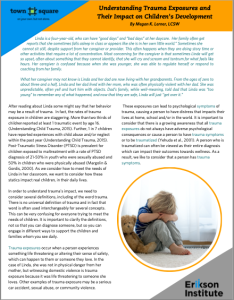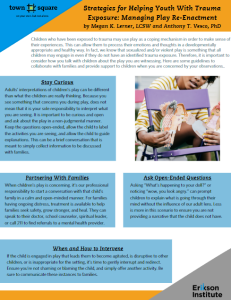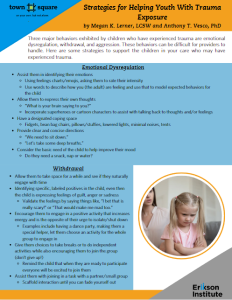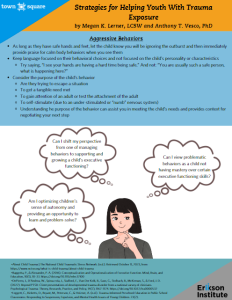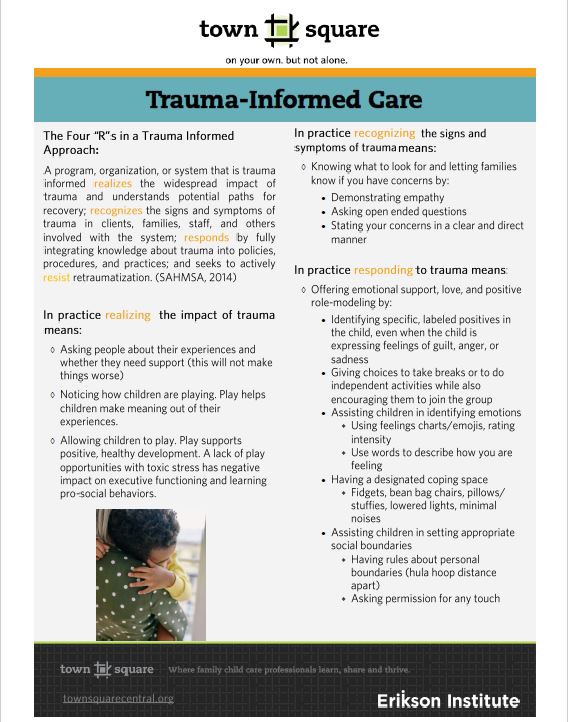This resource, from Megan K. Lerner, LCSW and Anthony T. Vesco, PhD, will help you work with families and children who are struggling with behavioral issues.
There are two versions of this resource, one to hand write and one to complete on the computer. 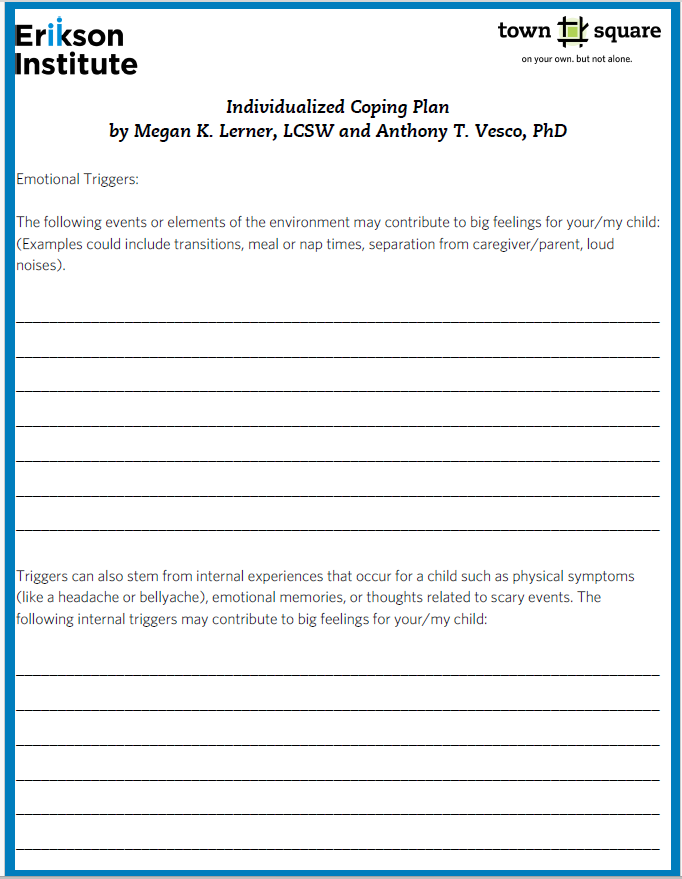
Understanding Trauma Exposures and Their Impact on Children’s Development
This printable handout by Megan K Lerner, LCSW supports adults in understanding how children can be impacted by trauma.
When providers encounter children engaging in play with troubling themes, it’s important to understand how to interact with the children in their play, when and how to interrupt, and how to talk to families about our observations. This one-page downloadable/printable document from mental health professionals Megan Lerner, LCSW and Anthony T. Vesco, PhD, can help prepare you for these difficult situations.
Supporting Children’s Development of Self-Concept
This resource was developed with Megan K. Lerner, LCSW, and Anthony T. Vesco, PhD, as part of their series on trauma informed principles and practices in Family Child Care settings.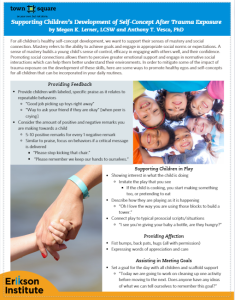
This nine-part course (approximately 3 hours and 45 minutes) from the National Child Traumatic Stress Network will teach participants about “early childhood social-emotional development; the impact of stress and trauma; reflect on the possible meanings of children’s behaviors; explore the influence of culture on families’ socialization goals; and become familiar with a number of strategies aimed to promote secure attachment and safe socialization practices.”
Providers will need to sign up for a free account to access this resource.
This printable/downloadable resource will help providers understand difficult behaviors that may be a result of trauma, and support children in developing skills to overcome their difficulties.
TS Strategies for Helping Youth With Trauma Exposure
Accessible version below:
Strategies for Helping Youth with Trauma Exposure
Strategies Emotional Dysregulation
Assist them in identifying their emotions
Using feelings charts/emojis, asking them to rate their intensity
Use words to describe how you (the adult) are feeling and use that to model expected behaviors for the child
Allow them to express their own thoughts
“What is your brain saying to you?”
Incorporate superheroes or cartoon characters to assist with talking back to thoughts and/or feelings
Have a designated coping space
Fidgets, bean bag chairs, pillows/stuffies, lowered lights, minimal noises, tents
Provide clear and concise directions
“We need to sit down.”
“Let’s take some deep breaths.”
Consider the basic need of the child to help improve their mood
Do they need a snack, nap or water
Strategies for Withdrawal
Allow them to take space for a while and see if they naturally engage with time
Identifying specific, labeled positives in the child, even then the child is expressing feelings of guilt, anger or sadness
Validate the feelings by saying things like, “I bet that is really scary!” or “That would make me mad too.”
Encourage them to engage in a positive activity that increases energy and is the opposite of their urge to isolate/shut down
Examples include having a dance party, making them a special helper, let them choose an activity for the whole group to engage in
Give them choices to take breaks or to do independent activities while also encouraging them to join the group (don’t give up!)
Remind the child that when they are ready to participate everyone will be excited to join them
Assist them with joining in a task with a partner/small group
Scaffold interaction until you can fade yourself out
Strategies for Aggressive Behaviors
As long as they have safe hands and feet, let the child know you will be ignoring the outburst and then immediately provide praise for calm body behaviors when you see them
Keep language focused on their behavioral choices and not focused on the child’s personality or characteristics
Try saying, “I see your hands are having a hard time being safe.” And not: “You are usually such a safe person, what is happening here?”
Consider the purpose of the child’s behavior
Are they trying to escape a situation
To get a tangible need met
To gain attention of an adult or test the attachment of the adult
To self-stimulate (due to an under-stimulated or “numb” nervous system)
Understanding the purpose of the behavior can assist you in meeting the child’s needs and provides context for negotiating your next step
Ask Yourself These Questions Before You Intervene
Can I shift my perspective from one of managing behaviors to supporting and growing a child’s executive functioning?
Can I view problematic behaviors as a child not having mastery over certain executive functioning skills?
Am I optimizing children’s sense of autonomy and providing an opportunity to learn and problem-solve?
The trauma-informed approach is guided by the “Four R’s”: Realize the widespread impact of trauma and understanding potential paths for recovery; recognize the signs and symptoms of trauma in clients, families, staff, and others involved with the system; respond by fully integrating knowledge about trauma into policies, procedures, and practices; and seeks to actively resist retraumatization. (SAHMSA,2014) This Town Square-created resource gives practical ways to utilize the Four R’s.
No words could describe our sadness, outrage, and devastation over the past few weeks. We are thinking about the children, teachers, and families who were and continue to be tragically affected by senseless acts of violence. As educators, parents, and humans, we too are struggling with our emotions and with what to say to children. Below are a few resources to use as we face these difficult conversations.
- All Our Kin has curated a list of resources for speaking with children about difficult subjects.
Resources for Speaking with Children About Difficult Subjects
- The National Child Traumatic Stress Networks (NTCTSN) develop resources focused on talking about shootings and how to help children with traumatic grief.
Talking to children about the Shooting
Helping Young Children with Traumatic Grief: Tips for Caregivers
Lastly, we want to share a resource from the Early Childhood Learning & Knowledge Center as a reminder of the importance of caring for ourselves, especially in moments of grief.
Caring for Ourselves as We Care for Others
The NCTSN offers information about many types of trauma, treatments, and other related topics. There are specific resources for parents and care providers as well as training. The mission of NCTSN is to raise the standard of care and improve access to services for traumatized children and families, as well as to raise public awareness about childhood trauma and stress. This page has resources for caregivers of young children who have been exposed to trauma.
“The most important adults in a young child’s life are caregivers and relatives. These adults can help reestablish security and stability for children who have experienced trauma.”
The National Child Traumatic Stress Network (NCTSN) created this report on childhood trauma to help anyone who works with children to understand what research is showing about the impact of trauma on young children.
“Young children are less able to anticipate danger or to know how to keep themselves safe, and so are particularly vulnerable to the effects of exposure to trauma.”
Included in the report are information about childhood trauma, behaviors linked to exposure to trauma, and the role of caregivers as protective factors for children. There are also resources for professionals and families.
National Child Traumatic Stress Network: Early Childhood Trauma

